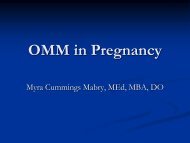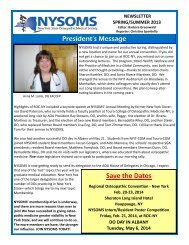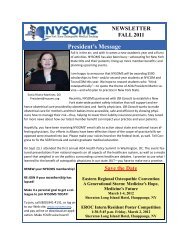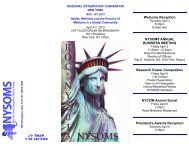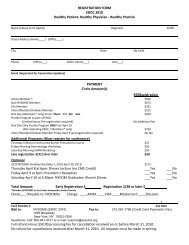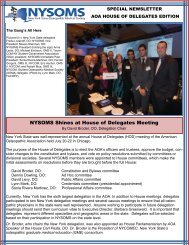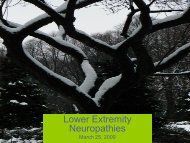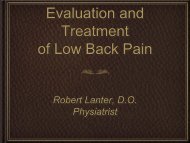Abstract Proceedings EROC 2011 - New York Osteopathic Medical ...
Abstract Proceedings EROC 2011 - New York Osteopathic Medical ...
Abstract Proceedings EROC 2011 - New York Osteopathic Medical ...
You also want an ePaper? Increase the reach of your titles
YUMPU automatically turns print PDFs into web optimized ePapers that Google loves.
<strong>EROC</strong> <strong>2011</strong> <strong>Abstract</strong> <strong>Proceedings</strong> – March 4, <strong>2011</strong><br />
Dept. of Emergency Medicine, Good Samaritan Hospital <strong>Medical</strong> Center, West Islip, NY<br />
Title: EM Residents Use Bedside Ultrasound to Diagnose Appendicitis and Avoid the<br />
Radiation of CT scans – The Effect of Feedback<br />
Authors: Andrew Flanagan DO, Joseph Artale, DO, Ronald Dvorkin MD, Jason Idelson DO,<br />
Diana Kontonotas DO, Andrew Mapley DO, David Teng MD, Steve Zimmerman MD<br />
Objective: We wish to demonstrate that in many cases appendicitis can be reliably diagnosed by<br />
Emergency Physicians and Residents with a bedside ultrasound examination in the Emergency<br />
Department. We hypothesize that a pilot study can identify >30% of cases of appendicitis (as<br />
compared to surgical pathology or CT scan if the case is managed non-surgically) with such<br />
specificity (few false positives) such that CT scanning would not be required in >30% of cases of<br />
appendicitis.<br />
Methods: We developed a 4 hour ultrasound training module for Emergency Residents to<br />
diagnose appendicitis. They were trained to identify a blind ended tubular and non-ovoid<br />
structure >6mm that is not compressible. The residents were blinded to other clinical findings<br />
and completed the data collection form before any other imaging studies were performed.<br />
Patients were also contacted at 7 days to determine if there was any subsequent pathology.<br />
Results: Initially we did not provide feedback to the residents. We found that they were not<br />
comfortable with lack of feedback and had low sensitivity. After September 23, 2009 we chose<br />
to give residents feedback after their data sheet was submitted. We found that the sensitivity<br />
increased, but since this was a change in the protocol, the IRB has not permitted us to report<br />
these subsequent results. Presently, the IRB has approved this changed protocol. We will report<br />
our findings at the AOCEP Scientific Seminar in September.<br />
Conclusion: Feedback may be useful in training Emergency Medicine Residents to reliably<br />
identify appendicitis with bedside ultrasound. We will recruit 175 additional cases to determine<br />
with a 95% certainty that the sensitivity is >30% and the specificity is >90%. If the findings can<br />
be confirmed by our ongoing follow up study, then CT scans could be eliminated in some<br />
patients and there would be the potential to decrease the lifetime risk of cancer in some of the<br />
100,000 pediatric cases of appendicitis seen annually.<br />
14



